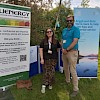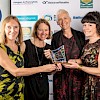

CEES Launches its' ‘Energy Solidarity Toolkit’
With recent EU Directives placing stronger obligations on Member States to tackle energy poverty while also acknowledging a growing role for energy communities (ECs), the Community Energy for Energy Solidarity (CEES) project is pleased to announce the launch of a practical guide to help ECs accelerate projects and programmes with valuable social impacts -The Energy Solidarity Toolkit.
The toolkit is packed with information for energy communities to tackle energy poverty and draws on the experience of six CEES Partners who undertook new activities over the period 2021- 2024 to provide enhanced services to households in vulnerable situations.
Key findings include:
- Offering energy solidarity services disrupts typical EC business models: While delivering social benefits, including low-cost, clean energy, is core to the mission of most ECs, the human resources required to undertake energy solidarity actions is difficult to absorb under existing business models.
- Working with vulnerable households requires different skill sets: Typically, ECs are staffed by people with expertise in technical and policy matters. Identifying and engaging with people facing energy poverty requires advanced ‘soft skills’ more closely linked to fields within the social sciences.
- Delivering services is more complex than anticipated: Boosting people’s understanding of energy and how to use it more wisely is a valuable mechanism to help them reduce energy bills or feel more comfortable in their homes. Carrying out customised interventions (even minor ones) is far more effective. All CEES Partners found, however, strong hesitancy towards the offer of home visits.
- Funding energy solidarity measures remains a substantial challenge: CEES Partners who previous provided such services relied heavily on grants to do so. Most attempted alternative funding methods during the project, with varying degrees of success. While crowdfunding schemes helped raise awareness of energy poverty and engagement in tackling it (particularly in countries where it is not yet well recognised), laws linked to the legal structure of energy cooperatives sometimes created obstacles. Notably, public engagement met the crowdfunding targets in one pilot project while heightened visibility of CEES Partners translated in to substantive service contracts in two cases.
A key output within the CEES Energy Solidarity Toolkit is an assessment of each type of energy solidarity mechanism undertaken by Partners in relation to three elements: a) material costs; b) human resources required; and c) ease of replicability. The information will help ECs determine what is feasible in relation to their own budgets and resources. In almost all cases, the time required of staff and/or volunteers is considerable and possibly prohibitive.
The Toolkit is an important response to a survey conducted by CEES (in 2021), which found that a large share of ECs were keen to build energy olidarity practices into their activities, but felt they required more information on how to go about it.
CEES applauds increased recognition within EU Directives of the vital role of ECs in tackling energy poverty. The experience of Partners, however, highlights the need, at both EU and national levels, to better enable this role in the following ways:
- Earmark resources: Funding should be increased not only for the technical and policy aspects of accelerating deployment of ECs but also for building the skill sets needed to effectively tackle energy poverty.
- Increase transparency and ease of access to funding: For small ECs, complicated application processes are a serious barrier to starting or scaling up energy solidarity actions. More effort to simplify procedures would enable delivery of the social impacts that governments seek to demonstrate.
- Support one-stop shops for energy solidarity: Within CEES, hosting public events (e.g. Energy Cafés) proved critical to building a level of trust that facilitated being invited to carry out home visits. As ECs are ‘new and unknown’ actors in many communities but have valuable knowledge and skills, collaborations with municipalities have proven effective in many cases.
- Encourage social dialogue: To date, most efforts to tackling energy poverty has focused on the technical and political solutions that can be implemented from the top down. CEES pilots demonstrate the need for lead actors to integrate people in vulnerability in early dialogue to
better understand their energy and broader needs – and to co-create solutions. - Generate innovative financing schemes: The CEES project showed that ECs are willing to get creative about fundraising. But, in some cases, existing legal structures undermine their ability to secure public or private sector support or, indeed, to engage citizens. Governments should seek to eliminate such barriers to encourage collaborative financing of energy solidarity measures.
- Improve targeting of available funds: Empowering ECs to play a role in mitigating energy poverty requires that available funds be allocated to the right people and initiatives. In turn, this requires a correct and complete transposition of EU provisions on ECs and energy poverty. This is currently lacking in many Member States, which risks ‘corporate capture’ of available funds.
A second valuable output of the CEES project is a detailed evaluation of each pilot, carried out by researchers at the University of Birmingham. In addition to providing in-depth insights of each pilot, this document (publication in August 2024) emphasises the importance of planning for evalution when implementing energy solidarity measures. Being able to ‘show’ – both quantitatively and qualitatively – the social impacts of such measures is critical to informing more effective policy and to securing additional funding.
You can download the full version or a summary of the CEES Energy Solidarity Toolkit here. Further information highlighting achievements of each CEES Partner that piloted new initiatives and provide contact details for more information is available on the CEES project page. General enquiries can be directed to: Marilyn.smith@en-act.org / +33 616018932.



